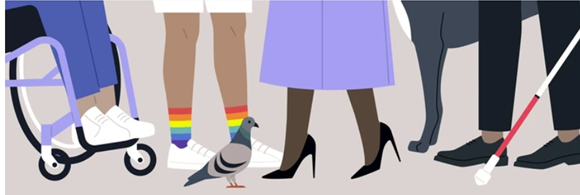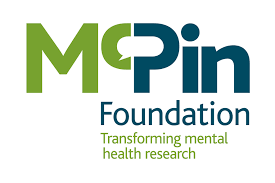Many of us have stereotypical perceptions of what
a disabled person looks like. However, perceptions
and stereotypes are often wrong.
Many of us with lived experience of mental illness may actually be a ‘disabled person’ without even knowing it.
Many of us may enjoy the additional legal protections that come with that, but do not know about them.
I see myself as a ‘disabled person’. That’s not something I am ashamed of at all. It’s something that brings me confidence, knowing I am protected.
I want to educate others suffering with mental illness, so they, too, are aware of their rights. My hope is that this will bring with it some additional confidence, knowing they are protected by the law.
What is a Disability?
Under the Equality Act 2010, only a limited number of conditions are specifically automatically deemed disabilities. For example, cancer, blindness and HIV.
However, other conditions can constitute a disability under the Equality Act, if they satisfy the following criteria:
· it is a physical or mental impairment;
· it has a substantial effect on your ability to carry out normal day-to-day activities; and
· it has lasted, or is likely to last, more than 12 months.
The legal test for a disability is based on what the impact of your condition would be without any medication or treatment. So, for example, when considering whether my mixed anxiety and depressive disorder has a substantial impact on my ability to carry out day-to-day activities, we would be considering the impact without taking Sertraline and without me receiving therapy.
“Substantial effect” means “more than minor or trivial”. At my lowest, prior to medication and therapy, I would find even the most ‘simple’ tasks completely overwhelming. For example, cleaning the kitchen, communicating with people, leaving the house, exercising, concentrating on the TV, getting ready to go out and paying bills all became much more difficult. Therefore, my mental impairment (mixed anxiety and depressive disorder) had a substantial impact on my ability to carry out day-to-day activities. I had also suffered with the condition for much of my life, so it had lasted longer than 12 months. Therefore, I have a disability for the purposes of the Equality Act.
When are you protected from discrimination?
If you are able to satisfy the definition of “disability” under the Equality Act 2010, you are protected from discrimination in a number of situations, most notably at work and when accessing goods, facilities and services.
What am I protected against?

A disabled person is protected from the
Following types of discrimination:
1. Direct Discrimination – when a person is put at a disadvantage or treated less favourably because they are disabled. For example, I tell a potential employer that I suffer with severe mixed anxiety and depressive disorder, they withdraw a job offer because of that and offer it to someone else without the same condition.
2. Indirect Discrimination – a working practice, policy or rule applies to everyone but puts a person or group at a disadvantage because of their disability. For example, a solicitor will only give legal advice to people who visit their office and will not offer advice electronically or by telephone. This would put people at a disadvantage whose mental illness makes leaving the house more difficult.
3. Discrimination arising from disability – when someone is treated less favourably because of something that results from a disability, not because of the disability itself. For example, if I am treated less favourably because I take Sertraline. I am not necessarily being treated less favourably because of my disability itself, but I am being treated less favourably because of something that arises from it.
4. Failure to make reasonable adjustments – broadly speaking this happens when an employer does not make reasonable adjustments which would remove or reduce a disadvantage related to someone’s disability. There are a wide range of adjustments that may be reasonable in different circumstances, and they will vary from person to person. For example, breaking down work into smaller tasks or agreeing a preferred communication method to help reduce anxiety.
5. Harassment – when someone experiences unwanted behaviour related to their disability which either: violates their dignity; or creates an intimidating, hostile, degrading, humiliating or offensive environment. For example, an employee suffers with an eating disorder and her manager makes jokes about people suffering with anorexia in front of other employees.
6. Victimisation – is when a person puts you at a disadvantage because you have made an allegation of discrimination. For example, the person in the above scenario complains to their employer that they have been harassed. Their employer then dismisses them because of this complaint. The disadvantage suffered (being dismissed) is because the allegation of discrimination was made, not because of the eating disorder/disability itself.
How this effects me
It may sound ‘stupid’, even to me, but sometimes a cap is the difference between me leaving the house and not.
I have suffered with Generalised Anxiety Disorder since I was a child; however, this developed into severe mixed anxiety and depressive disorder through adolescence and adulthood.
Earlier this year, I was at a point where I had made a lot of progress, but I still had my good days and bad days (I still do now).
On my bad days, I hated the way I looked. Getting ready to go out was a real struggle. I hated my hair (I had some back then). I would try on many, many outfits and I wouldn’t feel comfortable in anything. I didn’t feel comfortable in my own skin.
I had one of those days earlier this
year… I was close to just not leaving
the house… I just didn’t feel
comfortable.
Finally, after a long time of getting ready, I put on my plain black cap and some slightly baggier clothes. I felt ‘presentable’, and I forced myself to go out (albeit late).
We went to a bar. My friends went in first. I was stopped by the bouncer. He said: “I’m going to have to ask you to take off your cap”. I explained about my condition and that the cap was the only thing that allowed me to leave the house that night.
The bouncer explained that they had a dress code (there was nothing on their website about a dress code, and there were other people entering the bar in hoodies and baggy, blue jeans).
A second bouncer came over. He said that it was due to security and CCTV being able to see my face. I explained that both bouncers had now had lengthy conversations with me, had clearly seen my face and had even seen my ID. There was no issue in terms of security.
I explained that my anxiety and depressive disorder constituted a disability under the Equality Act 2010, and they had a duty to make reasonable adjustments. The first bouncer said he had never heard of that, so would go speak to his manager.
The manager just said “no”, with no further explanation and without coming to see me himself.
My friends stood inside watching for about 10 minutes whilst I tried to explain myself.
I went home after that, feeling defeated.
I appreciate the cap may not have been appropriate in certain circumstances, but this was not one of those instances. I thought I looked quite smart, for a bar, in spite of the cap. As I say, there were other people entering in much less smart attire.
None of the bouncers could justify the reasons for their unwritten ‘policy’ in this case. They came up with a few different explanations, none of which stood up to the slightest bit of scrutiny.
It may have seemed like a small, insignificant thing for them… but, it was huge for me. The fact it was small and insignificant for them shows that the adjustment could have easily been made.

I explained the situation to my brother. He recalled an incident in which he went to a restaurant with our nan when she was undergoing cancer treatment. She had lost all her hair. One of the waiters asked her to remove her hat. She was very self-conscious at that time, and it was completely dehumanising.
“We have a policy, no” will never be the right answer. Often business have had policies in place for so long, they cannot even remember why they were implemented in the first place.
If businesses have a policy that puts disabled people (including those with mental illness) at a disadvantage, they have a duty to make reasonable adjustments for that individual to alleviate the disadvantage suffered.
The next morning, I sent an e-mail to the bar, threatening legal action for their failure to make reasonable adjustments pursuant to the Equality Act 2010.
They responded, apologising for what had happened and invited me for a coffee to discuss how they could do better in future.
It was a shame it had to get to that stage for them to actually listen. The time to listen was on the night.
I am conscious that I am in a privileged position, in that I am a lawyer and I know my legal rights. If I hadn’t known my rights at that time, not only would I have gone home defeated, but I may have been even more reluctant to leave the house at all in future.
Empowering Conversations
I want to empower those with mental illness to have these conversations and give them confidence knowing the legal protections they have.
I also want to empower others, who do not suffer with mental illness, too. I have often heard: “I don’t want to say the wrong thing”.
Often when people hear “mental illness” or “disability”, they tend to ‘clam up’, particularly in the workplace. As someone who suffers with anxiety, saying nothing, because you are worried you might say the wrong thing, is probably the worst option. That just leaves all that open space for my mind to fill in the gaps and worry about what your thoughts and intentions really are.
Another scenario, when you say you are struggling, is that the conversation starts to become very formal, and more like a ‘tick box’ exercise to ensure ‘compliance’ with legal obligations. I don’t like this either. The natural interaction between two human beings is lost. If a person who is suffering from mental illness does not feel that you care about them, they are much less likely to be as open about their condition and their needs. That will make getting to the right answer so much more difficult.
My view is that your starting point, before looking at the law, should always be kindness, compassion, empathy, openness and common sense.
The Equality Act
Itself includes terms like “reasonable” and “proportionate”, so use your common sense and have these open conversations. One person’s needs will be very different to another’s.
The answer may be simple. ACAS has released new guidance this year on potential reasonable adjustments for those suffering with mental illness. For someone with anxiety, like me, it can be as simple as working with people you can trust. That should be a given anyway, right?
If the answer is simple to you, but the relief from disadvantage for the person with mental illness is huge, that’s even more reason to implement it! Take my story with my hat. To the bouncers, it seemed small. They just kept asking me repeatedly “just take off the hat”. But to me, who hated the way he looked, it was huge and was what allowed me to be there that night.
I’ve had a few conversations recently where people have actually told me: “I am worried I might say the wrong thing”. I have really appreciated this openness. It has reassured me that they care and want to work with me but are unsure how best to do that.
Their honesty allowed me to reassure them too and their open-mindedness and compassion and allow us to explore the issues together. I didn’t expect them to have all the answers, but the honesty on both sides allowed us to move forward in the conversation and find the answers together. They could reassure me and I could reassure them.
There do not have to be any “losers” in these situations. If you treat people with kindness

Matt Stone
LEAD Lived Experience Director, Non-Practicing Solicitor and all round great guy
Follow Matt on Linkedin HERE
Do you want to write a blog for us?
If you’d like to contribute, we can support you by listing your webpage or service contact on this webpage, growing your reach, and mutually aiding.
Submissions can be sent to info@livedexperienceleaders.com
(you will be asked to fill in a well-being questionnaire about sharing your experience, and a consent form which can be revisited at any time) https://forms.office.com/e/hHiyYjmkgA
Please indicate if you would like to remain anonymous on the blog





